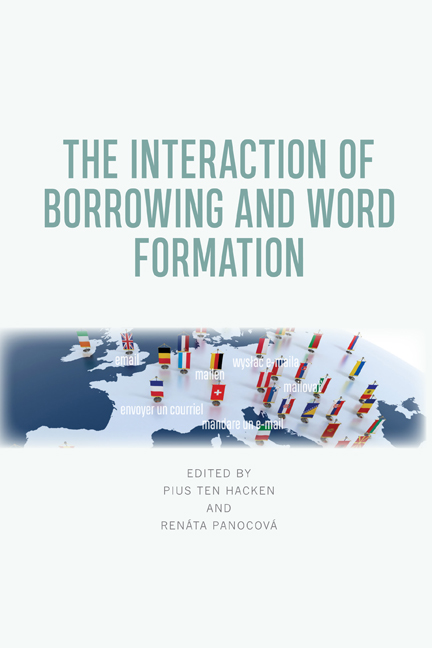Book contents
- Frontmatter
- Contents
- List of Figures and Tables
- List of Contributors
- Preface
- List of ISO-639 Language Codes
- Introduction
- 1 Word Formation, Borrowing and their Interaction
- Part I Compounding
- 2 Compounding and Contact
- 3 Neoclassical Compounds between Borrowing and Word Formation
- 4 Borrowed Compounds, Borrowed Compounding – Portuguese Data
- 5 Compound Calques in an Eighteenth-Century German-Lithuanian Dictionary
- 6 (Pseudo-)Anglicisms as Nominal Compounds in Italian
- Part II Affixation
- 7 The Role of Borrowing in the Derivation of Passive Potential Adjectives in Polish
- 8 How an ‘Italian’ Suffix Became Productive in Germanic Languages
- 9 The Suffixes -ismus and -ita in Nouns in Czech
- 10 The Interaction between Borrowing and Word Formation: Evidence from Modern Greek Prefixes
- Part III Naming in Minority Languages
- 11 Loanword Formation in Minority Languages: Lexical Strata in Titsch and Töitschu
- 12 Examining the Integration of Borrowed Nouns in Immigrant Speech: The Case of Canadian Greek
- 13 Interaction among Borrowing, Inflection and Word Formation in Polish Medieval Latin
- Conclusion
- 14 Trends in the Interaction between Borrowing and Word Formation
- Author Index
- Subject Index
Preface
Published online by Cambridge University Press: 22 September 2020
- Frontmatter
- Contents
- List of Figures and Tables
- List of Contributors
- Preface
- List of ISO-639 Language Codes
- Introduction
- 1 Word Formation, Borrowing and their Interaction
- Part I Compounding
- 2 Compounding and Contact
- 3 Neoclassical Compounds between Borrowing and Word Formation
- 4 Borrowed Compounds, Borrowed Compounding – Portuguese Data
- 5 Compound Calques in an Eighteenth-Century German-Lithuanian Dictionary
- 6 (Pseudo-)Anglicisms as Nominal Compounds in Italian
- Part II Affixation
- 7 The Role of Borrowing in the Derivation of Passive Potential Adjectives in Polish
- 8 How an ‘Italian’ Suffix Became Productive in Germanic Languages
- 9 The Suffixes -ismus and -ita in Nouns in Czech
- 10 The Interaction between Borrowing and Word Formation: Evidence from Modern Greek Prefixes
- Part III Naming in Minority Languages
- 11 Loanword Formation in Minority Languages: Lexical Strata in Titsch and Töitschu
- 12 Examining the Integration of Borrowed Nouns in Immigrant Speech: The Case of Canadian Greek
- 13 Interaction among Borrowing, Inflection and Word Formation in Polish Medieval Latin
- Conclusion
- 14 Trends in the Interaction between Borrowing and Word Formation
- Author Index
- Subject Index
Summary
The interaction between borrowing and word formation is a topic that has fascinated us for a long time. Given the variety of situations in which different linguistic and cultural factors determine this interaction, it is hardly possible for two people to give a proper overview of the topic. It is therefore with great pleasure that we present in this volume twelve contributions by different scholars, each with their own specialisation. These contributions are framed by an introduction setting out some general issues and a conclusion formulating some generalisations. Of course, we cannot pretend that this amounts to an exhaustive treatment, but the collection of case studies of European languages gives some new insights and highlights some previously not widely known contexts of interaction. In this way, we hope to make a useful contribution to the research on our topic.
A collection such as this is of course only possible with the active contribution of the authors of the various chapters. We would like to thank them for writing their chapter and for their prompt responses to our comments and suggestions. We would also like to thank two Lauras. Laura Williamson of Edinburgh University Press encouraged us to edit this volume and gave us advice and deadlines that helped us to produce it within a reasonable time. Laura Rebosio was a very meticulous and accurate editorial assistant, who contributed significantly to the present form of the volume.
- Type
- Chapter
- Information
- Publisher: Edinburgh University PressPrint publication year: 2020



